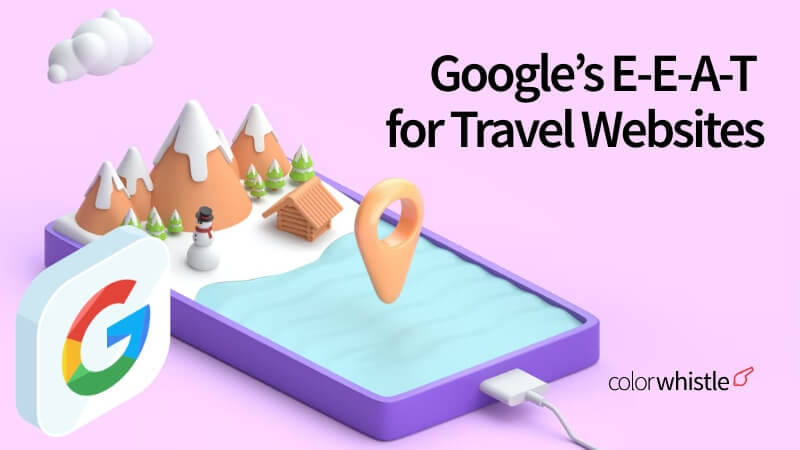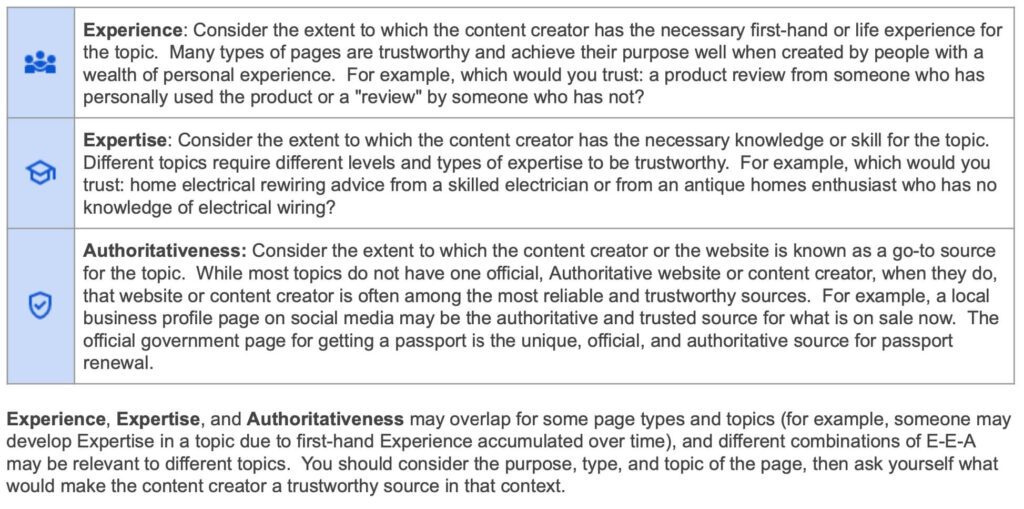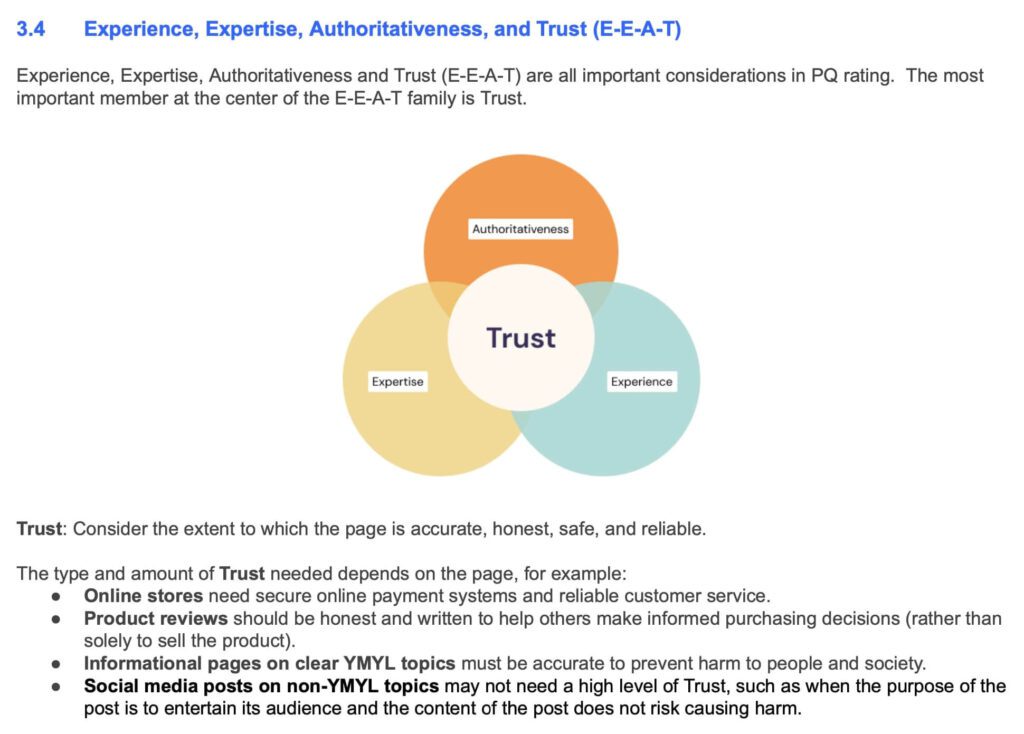What do people expect from Google search results?
Most expect to read valuable content coming from someone who has actually experienced the topic firsthand.
To address the same, Google announced an update to its existing quality rater guidelines E-A-T as of December 2022, now calling it E-E-A-T.
The acronym E-E-A-T stands for Experience, Expertise, Authoritativeness, and Trustworthiness.
How Brands Want People to Search on Google?

Enter a search query -> Your brand website ad appears -> Book your services
But How Do People Actually Search?
Enter a search query -> Google analyzes and displays results per keyword -> Visitor clicks -> Interrupted by WhatsApp chat -> Sleeps.
… a week later…
Notices a display ad from your brand -> Visits the landing page -> Bookmarks it -> Checks out the brand profile on Instagram -> Share it with spouse -> Logs out
… 2 days later in the office…
Visits your site -> Confirm their bookings.
So, if you manage a travel website and want your website to rank well in Google search results, it is important to consider the E-E-A-T guidelines.
Additionally, E-E-A-T marketing is a good way to indicate genuine efforts in generating first–hand content (aside from Google saying it’s important).
We shall further break down Google’s E-E-A-T quality rater guidelines for travel websites here.
What are Google’s E-E-A-T Quality Rater Guidelines?
New E-E-A-T quality rater guidelines are a set of criteria that Google uses to assess the quality of websites and web pages.
These guidelines are important for determining whether a website is a good source of information and whether it should be ranked highly in Google search results.
- Experience: The website should demonstrate that the creators have first-hand experience with the destinations or activities they are writing about. This could be through personal travel, working in the travel industry, or other means.
- Expertise: For travel websites specializing in specific destinations or travel topics, demonstrating expertise becomes even more critical. This specialization can help attract a highly targeted audience, resulting in better engagement and conversions.
- Authoritativeness: The website should be seen as a reliable source of information by other experts in the travel industry. This could be through citations from other reputable travel websites, awards or recognition from industry organizations, or positive reviews from other travelers.
- Trustworthiness: The website should be honest and unbiased in its presentation of information. The creators should not be trying to sell anything or promote a particular agenda.
Although Double-E-A-T is not the official algorithm, it’s a set of principles that Google’s Quality Raters use when manually assessing the quality of web pages. These assessments, in turn, can influence how the pages are ranked in search results.
Explore how to optimize your travel website content per E-E-A-T in the following sections.
Need for E-A-T to get an Extra E for Experience
Anyone familiar with the rigors of print media in the past will agree to the declining digital media ethics in the present.
It has led to exaggerated or misleading representations of stories and events to capture readers’ attention online, even if it sacrifices accuracy or context.
Moreover, the unlimited revenue potential of Curated Content Marketing blinds new businesses to generate subject matter content just to attract traffic, ignoring the availability of first-hand experience or information about the same.
But more often than not, travelers value content that is produced by someone who has first-hand, life experience on a particular travel destination, that adventure trek route, or hotel recommendations.
Therefore, to better assess and “indirectly” influence search results, E-A-T is gaining an E: experience, and has become E-E-A-T, or Double-E-A-T.
Also Read
Travel Information Websites Gaining Healthy Engagement with Double-E-A-T (ing)
Lonely Planet & Condé Nast Traveler
- Team of experienced travel writers and photographers who produce high-quality, original & accurate content.
- Strong social media presence and engagement with its audience on a regular basis.
- Niche travel website focussing on cultural experiences.
- They source content from first-hand experienced writers.
- Reviews and ratings of hotels, restaurants, and other travel destinations among a credible user base.
Why is Google’s E-E-A-T Important for Travel SEO?
YMYL travel topics
Target potential travel keywords
Mobile-first indexing for travelers
Sourcing reliable travel information
Simply put, if Google believes that a travel website has high E-E-A-T, it is more likely to rank that website highly in search results.
There are a few reasons why E-E-A-T is so important for travel SEO.
First, some travel information websites cover YMYL (Your Money or Your Life) topics.
This means that the information that people find on travel websites can have a significant impact on their lives.
For example, if someone is looking for information about a hotel, they want to be sure that the information they find is accurate and up-to-date. They don’t want to book a hotel that is dirty or dangerous.
Second, there is a lot of competition for general search terms and travel keywords.
This means that travel websites need to do everything they can to stand out from the crowd as they rarely convert on the first visit. There are a lot of potential keywords to focus on and strategies required to get repeat visits.
Third, a majority of travelers use mobile devices to plan trips.
Google’s mobile-first indexing considers factors like page speed, mobile responsiveness, and user experience, all of which can be influenced by E-E-A-T principles.
Finally, E-E-A-T can help to build trust with potential customers.
When people are looking for travel information, they want to be sure that they are getting the information from a reliable source. This can lead to more people visiting the website and booking travel through it.
Also Read
How will Double-E-A-T Content Impact SEM for Travel Information Websites?
Ad Quality and Landing Page Relevance
Ad Extensions
Reputation and Click-Through Rates
Ad Copy and Messaging
While Search Engine Marketing (SEM) primarily focuses on paid advertising and gaining visibility through paid search, the principles of E-E-A-T can influence the effectiveness of travel website SEM strategies.
Integrating E-E-A-T principles into SEM strategies by prioritizing relevance in ad campaigns, ad positions, landing page experience, and click-through rates can lead to more effective and successful paid advertising campaigns. Let’s explore this.
First, Google ads that align with the principles of E-E-A-T and lead to high-quality, authoritative, and trustworthy landing pages are more likely to achieve higher Quality Scores.
Higher Quality Scores can lead to better ad positions and lower cost-per-click (CPC) for the same bid.
Second, ad Extensions can enhance the visibility and credibility of paid ads.
Using ad extensions like site links, callouts, and structured snippets can help travel websites showcase their expertise, highlight awards or certifications, and build trust with potential customers. Learn more about it in detail here.
Third, travel websites that are recognized as experts in their niche and have a strong reputation are more likely to attract clicks from users.
Higher click-through rates (CTRs) are favorable for SEM campaigns, as they signal to search engines that the ad is relevant and valuable to users, potentially leading to improved ad positions.
Finally, crafting ad copy that showcases the expertise and trustworthiness of the travel website can increase the likelihood of ad clicks.
Including trust signals, such as customer reviews or industry affiliations, can help persuade users to choose the advertised website over competitors.
Role of Google’s E-E-A-T Content in SMM of Travel Companies
Signal Content Credibility
Build User Trust
Establish Brand Authority
Maintain Consistency and Transparency
Social Media Marketing (SMM) for travel companies primarily involves promoting and engaging with the audience through social media platforms.
However, the principles of Double-E-A-T can impact the effectiveness and success of these marketing efforts.
First, E-E-A-T encourages the creation of high-quality and credible content.
Eventually, credible content is more likely to be shared, liked, and commented on, increasing the reach and engagement of social media posts.
Second, E-E-A-T helps travel companies build user trust through the consistent sharing of information on social media platforms.
Trustworthy brands are more likely to attract loyal customers who engage with and advocate for the company.
Third, E-E-A-T principles establish travel companies as authorities in the travel industry.
By sharing content that showcases expertise and thought leadership, the company can position itself as a go-to source for travel-related information, tips, and recommendations.
Finally, E-E-A-T encourages consistency and transparency in content creation and communication.
Working with influencers who have established expertise and authority in the travel niche can enhance the credibility and effectiveness of the marketing campaign.
Additionally, responding to reviews, whether positive or negative, in a professional and helpful manner can also impact the perception of the company’s trustworthiness.
3 Tips to Optimize Travel Websites for E-E-A-T
Now that you know E-E-A-T is about Google’s algorithm and its influence on Google SERP.
When you emphasize experience, expertise, authoritativeness, and trustworthiness, you’re adopting a comprehensive approach to SEO, SEM, and SMM.
Let these four pillars boost the credibility of your content marketing.
Put the following E-E-A-T best practices to use and make your travel website more authoritative and trustworthy:
Optimizing Author Bio
For example, here’s a quick collection of author bios for Colorwhistle blogs, contributing to curated pieces of content per their experience and expertise.






Author bio may be an age-old practice, but with the advent of E-E-A-T, it has become even more important to boast the author’s academic expertise and professional experience on the subject matter posted.
For vacation booking websites, user reviews must be moderated, and a verified batch may be applied next to it for authority.
This exercise should continue on the About page, social media profiles, GMB page, and other public information websites. Example: “About Our Travel Company: Committed to Creating Unforgettable Journeys Since 2005.”
There may be scope for misinformation here but is counter-balanced by the third-party brand trust signals from social media, user-generated content, and otherwise.
Collab with Experts like You
Good content always wins.
But you can team up with another brand via guest posts or research. Example: “Interview with Renowned Travel Blogger: Top Travel Trends for 2026.”
You can also cite reliable sources and link (important step) to reputable travel authorities when presenting data or statistics. Example: “According to the World Travel & Tourism Council, Travel and Tourism contributed 7.6% to the global GDP in 2022.”
In addition to generating quality content, you also conform to Google’s priority of sourcing content from reputable sources for top search results.
Repurpose and Refresh Your Content
Travel content can become outdated and, more often than not, seasonal.
Therefore, it’s important to periodically review your content to ensure its accuracy.
Pay attention to elements such as outdated seasonal dates, links, tech stack, and your SEO approach. You will find more useful tips on repurposing your existing content in our previous blog here.
Also Read
Consult a Travel Digital Marketing Services Company
E-E-A-T marketing and optimization is an ongoing process that requires a commitment to delivering valuable and trustworthy content to your audience.
You need consistent output from expert creators to build a strong online reputation and attract more organic traffic, ultimately leading to better user engagement and conversions.
Consult our expert travel content strategist to boost your E-E-A-T marketing content. You can write to us or call us at +1 (210) 787 3600 anytime to enquire more.
Kindly leave your comments down below if you found the information in this blog useful and wish to learn more.
What’s Next?
Now that you’ve had the chance to explore our blog, it’s time to take the next step and see what opportunities await!








E-E-A-T boosts travel website credibility. Showcasing real experiences, expert advice, and trustworthy content helps rank higher and build loyal audiences in the travel space.